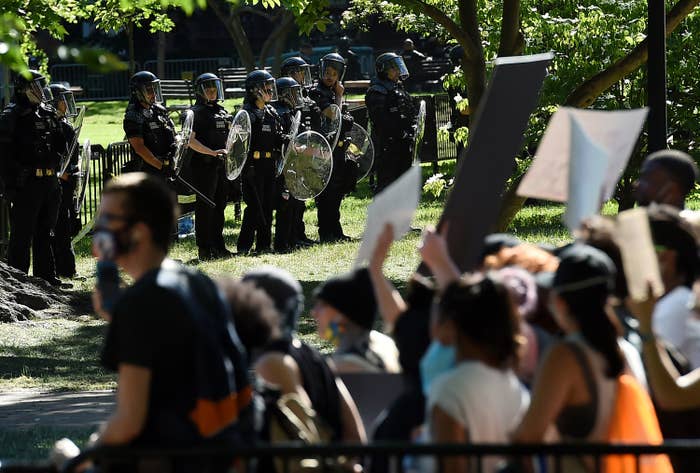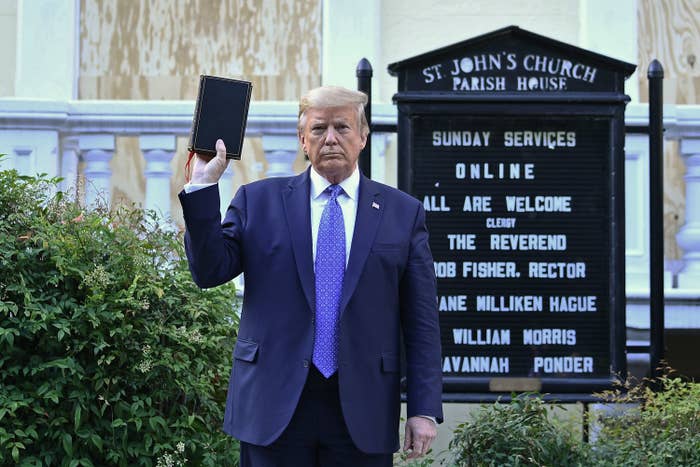
WASHINGTON — The identities of federal officers accused of using unconstitutional force to clear protesters in front of the White House in June before President Donald Trump walked through for a photo op can remain secret for now, a federal judge ruled Wednesday.
Black Lives Matter DC and other protesters who filed suit over the June 1 incident at Lafayette Square had asked the judge for permission to seek documents and other information from the government early in the case to identify officers who were on the scene, those who were equipped with weapons, and those who used their weapons.
The plaintiffs are pressing claims in federal court in Washington against individual officers involved, as well as against Trump, Attorney General Bill Barr, and other senior administration officials.
This type of information exchange, known as discovery, usually happens later in a case, and US District Judge Dabney Friedrich ruled that the plaintiffs failed to show they were entitled to do it now. She noted that they weren’t asking for a preliminary injunction or other immediate action from the court, and the Justice Department hadn’t had a chance to respond to the lawsuit or argue for early dismissal yet.
The Trump administration deployed federal officers in riot gear to respond to antiracism protests in Washington earlier this summer, and there were numerous reports that officers did not wear identifying information and refused to identify themselves and their agency when asked. DC isn’t the only city where the use of unmarked federal officers came under scrutiny — officers deployed to Portland to respond to protests also lacked identifying information on their uniforms.
On June 1, federal officers and local police from DC and Virginia forcibly cleared out protesters who were gathered in Lafayette Square in front of the White House. Protesters and journalists reported that officers fired rubber bullets and other projectiles, and used chemical agents; the US Park Police objected to reports using the term “tear gas” even after acknowledging officers used tear-inducing chemicals.
Once the square was cleared, Trump, Barr, and other administration officials passed through the area on foot, and Trump posed for photographs in front of a nearby church that was burned during earlier demonstrations.

Lawyers for the DC Black Lives Matter chapter and other protesters who sued argued that they needed to identify the officers involved to effectively pursue the case. They asked for the identities of the officers on the scene and who were recorded as discharging their weapons, as well as photographs of those officers, so that they could be matched with photos from the scene at the time.
Friedrich’s ruling on Wednesday doesn’t rule out the possibility that the plaintiffs could learn the officers’ identities later; if the lawsuit survives early efforts by the government to get it tossed out, the plaintiffs could then submit requests to the local, state, and federal entities named in the lawsuit for documents and information. It could take months to get to that stage of the case, however.
Friedrich wrote that she was “cognizant of the time pressures the plaintiffs face in obtaining this information and will oversee the coming stages of this litigation with those pressures in mind.”
The Justice Department and a spokesperson for the plaintiffs' legal team did not immediately return requests for comment.
The judge ruled that information about which officers were equipped with weapons and who used their weapons in Lafayette Square “overlaps considerably” with the unconstitutional use of force claims that are at the heart of the case. Since it was too early for the judge to rule on the merits, she found that weighed against allowing the plaintiffs to get the information early on.
Friedrich also noted that even if the plaintiffs were able to find out the identities of the officers who used force in the square, that information likely would need to stay under seal and out of the public eye for some period of time.
“[P]rovision of this sort of highly sensitive law enforcement information implicates core institutional interests of the organizations affected as well as substantial privacy interests of the individual officers who are the subjects of the request,” the judge wrote.
Friedrich is one of Trump’s four appointees to the federal district court in Washington. Federal judges have lifetime tenure and are not obligated to rule in favor of the presidents who appoint them, but Trump has made the confirmation of conservative judges a central part of his political agenda and has publicly criticized judges who rule against him.

